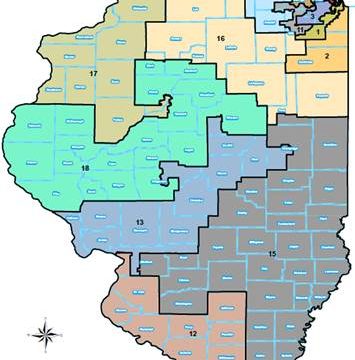Illinois voters want to take drawing political maps out of politicians’ hands

By Benjamin Yount | Illinois Watchdog
SPRINGFIELD, Ill. — Voters in Illinois who don’t want politicians to draw the state’s political maps are one step away from putting the question up for a vote.
PUZZLE PIECES: Illinois lawmakers draw the maps they want to see.
Unfortunately, that step means letting Illinois’ political machines whack at their reform attempts.
“We anticipate a lot of scrutiny,” Mike Kolenc, the campaign manager for Yes for Independent Maps, told Illinois Watchdog. “This a lot of power that the status quo would be giving up. We expect a robust challenge to our signatures, and we’re ready for that.”
His group has collected nearly 500,000 signatures to get a new redistricting process placed on the November ballot, well more than the 298,000 needed.
If Kolenc and his group get their way, voters will decide if a computer should be given the job of drawing Illinois’ political boundaries, or if lawmakers will continue to draw lines that benefit them.
“This is not about pointing out which districts are drawn incorrectly. This is about putting in place an independent process that is transparent, drawing maps with non-partisan criteria,” Kolenc added.
Illinois uses a commission made up of five Democrats and five Republicans to draw its political map once every decade. A drawing determines the eleventh member, and thereby decides whether Democrats or Republicans will control the redistricting process.
“Drawing a name out of Abraham Lincoln’s stovepipe hat,” Kolenc said.
He said, in effect, the process allows lawmakers to choose their voters and not the other way around.
Illinois went to the commission map process after ignoring political maps for decades.
David Morrison, deputy director of the Illinois Campaign for Political Reform, said Illinois voters approved the commission and lawmakers quickly started to use it to their advantage.
“The maps comply with the constitutional requirements that they be substantially equal in population and contiguous and such, but the maps also have the added feature of magnifying the political power of the party that drew them,” Morrison said. “That outcome was not intended, and of course runs counter to the goal of holding free elections for public office.”
But the powers that be are dismissing the push for a new process as simply the whining of the political party out of power.
“Over the last 50 years, five maps,” House Speaker Mike Madigan told reporters earlier this week. “Republicans have done one out of five. They’re angry, and this is part of their Republican politics. That’s all there is.”
Kolenc said both Republicans and Democrats have a lot invested in the current redistricting process, and he expects neither party to give that up without a fight.
Redistricting reformers expect to deliver their 500,000 signatures to Illinois’ State Board of Elections next week.
Contact Benjamin Yount at Ben@IllinoisWatchdog.org and find him on Twitter @BenYount.







